March 31, 2020 - Do foreigners in Croatia feel more or less safe sitting out COVID-19 here than in their home country, and what are their experiences? A new series on TCN, starting with entrepreneur Mirela Rus from Romania, currently holed up in Split.
Oxford University recently published some research on government responses to coranavirus which showed that Croatia currently has the strictest measures in the world. While inconvenient, this is a good thing in terms of reducing the spread of the virus, and I am certainly not alone in my admiration of the official Croatian handling of this crisis in recent weeks, both in terms of action and communication.
But what do other expats here think? And how does it compare with the response in their home country? Would they rather sit this one out here or there? In the first of a new series on TCN, we will be featuring expats from all over the world to see what their views are on life in corona Croatia rather than back home. We start with our favourite Romanian in Croatia, entrepreneur Mirela Rus in Split, who was happy to share her thoughts.
If you would like to contribute to this series, full details are below. Now, over to the one and only Mirela Rus.
Firstly, how are you? Are you alone/with someone? Tell us a little about your situation and sanity levels.
Luckily, I am with my partner, Ionut (and our three cats), and we are actually used to spending 99% of our time together, we both worked pretty much from the house in the past 10-12 years. So the part about having to stay inside is not the hard one for us. The bonus is that we can sit on our terrace and calm down by looking at the sea in front of us (in the distance, but still, it is a sea view and that is one of the things I am so thankful for right now).
What drives us crazy though (and we are on a rollercoaster of emotions every day, like most, I suppose) is the uncertainty. Is our family going to be OK at the end of this? Are we gonna be OK?
We have two shops in Split, where we sell our own handmade nautical jewellery – a business totally dependent on tourism. We are closed now, and we do not know if we will be able to reopen in June, in August or at all this year. And if we are able to re-open, will Split still have tourists coming? And if we do have tourists coming, will they have enough money to spend on souvenirs anymore, after they themselves being in a crisis? So, basically, will our business survive this? And, if not, how will we be able to support ourselves here, where we have no family to rely on.
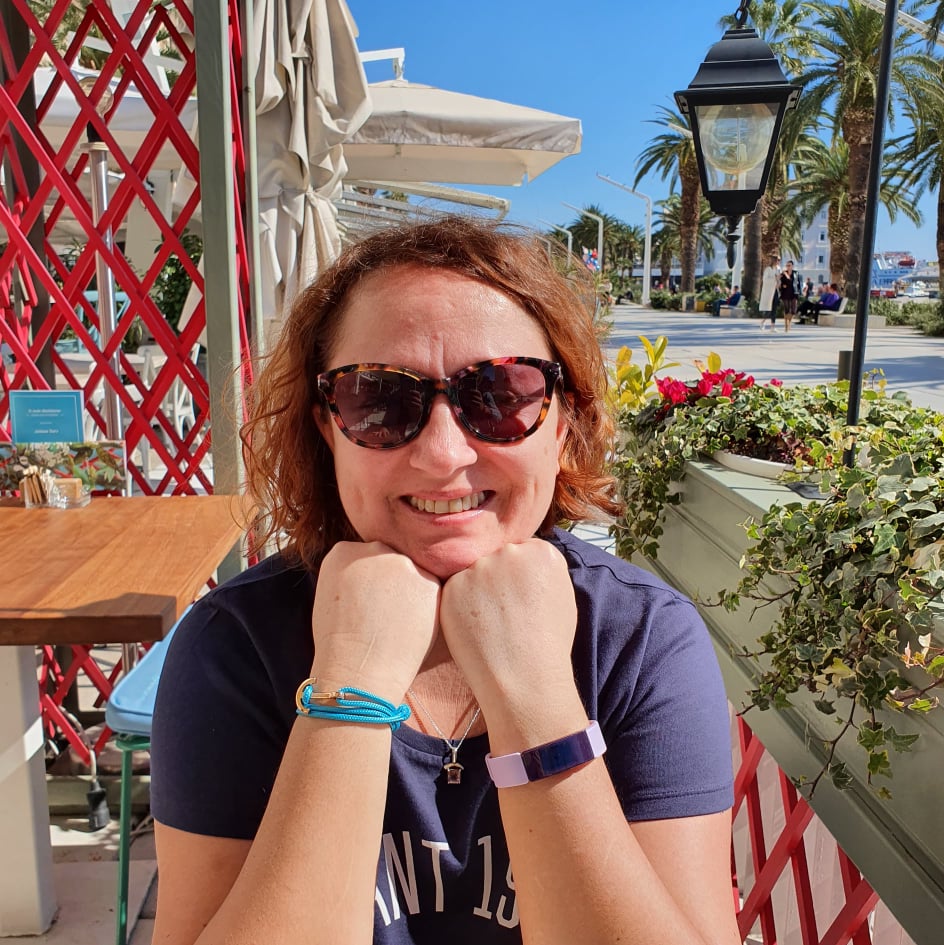
(Last day of freedom in sunny Split)
What do you think about the economic measures the government is taking, are they helping your business?
As a foreigner with not many local ties, finding out how to apply and what the conditions are for the measures that are already starting to be implemented, was the hardest part.
Thank you, actually, for putting me in contact with your TCN colleague Iva Tatic, who helped us apply for the 3250kn per employee (NB, if any other foreigner needs Iva's help, contact This email address is being protected from spambots. You need JavaScript enabled to view it. Subject Iva). We did not get a reply on that yet, and I was also disappointed to see that it does not apply for employees hired after 29.02. I think the date was arbitrary, it should have been the date before they announced the closing of all non-essential businesses. We currently have two employees (besides me and my partner) and we hired them on March 1st, when we reopened our shops (since our business is 100% seasonal) and we could not bring ourselves to fire them, once we had to close the shops. I think it is unfair that we cannot get this aid for them. Since we are willing to keep them on payroll three more months after these 3 months aid is done, I think we should be entitled to receive it.
Like everyone else, I also think the currently announced measures are far from actually helping too much. I would give 10 points to the administration for having the application process for tax deferral online and fast-tracked (we were approved in a day or so). But these taxes will still have to be paid, while we are not sure we will still have a business when this is over. I am hoping the new package Plenkovic announced for this week will be more in the line of what entrepreneurs are asking for. I was happy to see they have mobilized and are asking to have a voice in this. I do believe the economy minister should have already been replaced though.
When did you realise that corona was going to be a big issue?
Pretty early on, since I am used to following world news. I actually just looked at my Facebook post from January. I first got worried on January 14th, when the BBC announced the first case outside China.
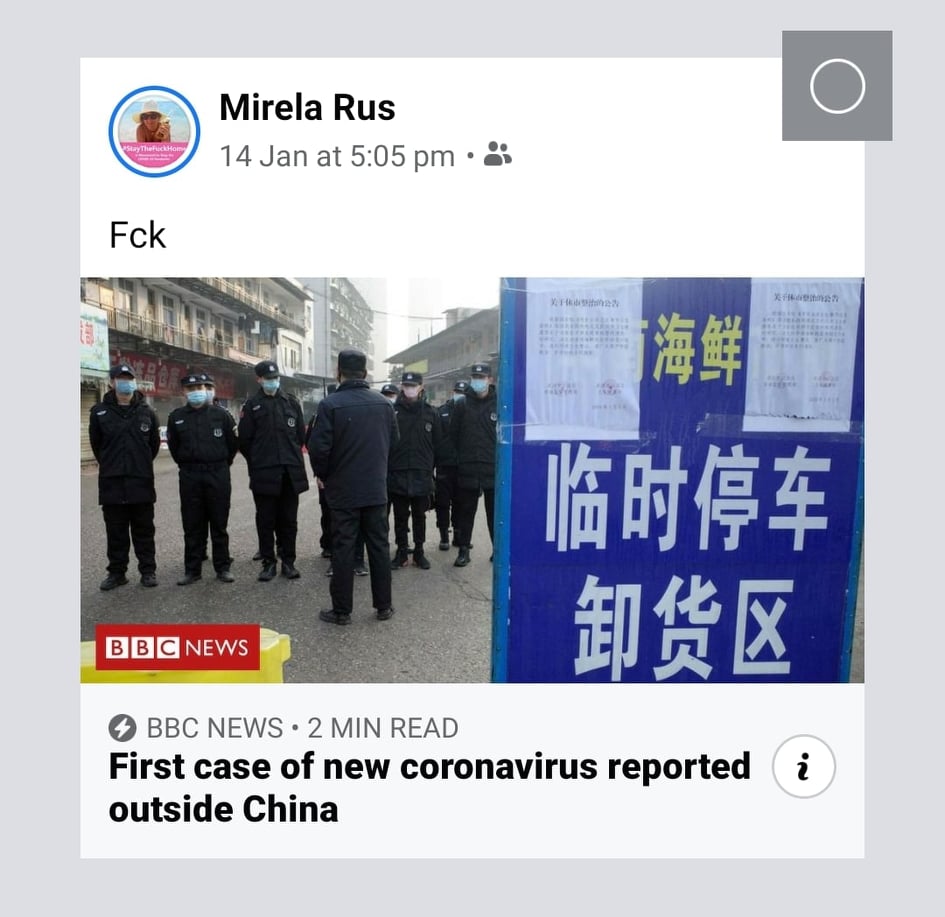
Then really worried and frustrated on January 26th, when a bus full of tourists from Wuhan (!!!) was allowed into Croatia like it was business as usual.
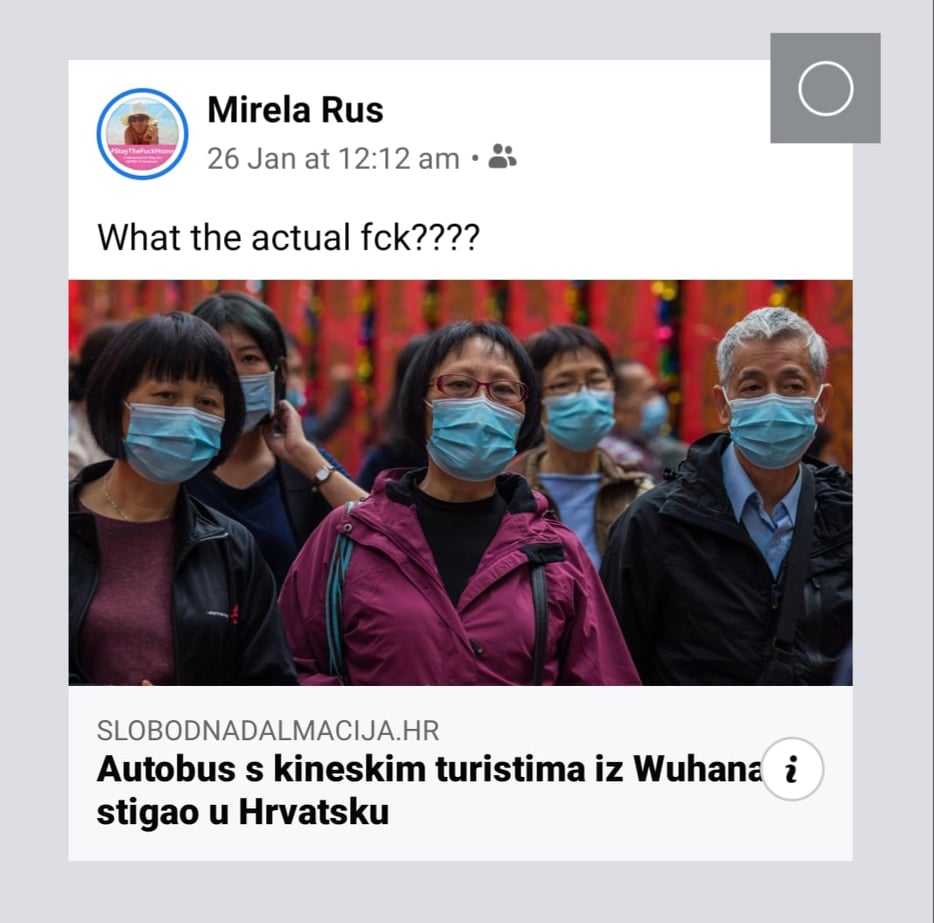
But the first REAL sign that this was not just some casual flu was, for me, on January 29th, when British Airways suspended all flights with China. That was something unprecedented which my former-journalist-mind perceived as confirmation of bad things to come.
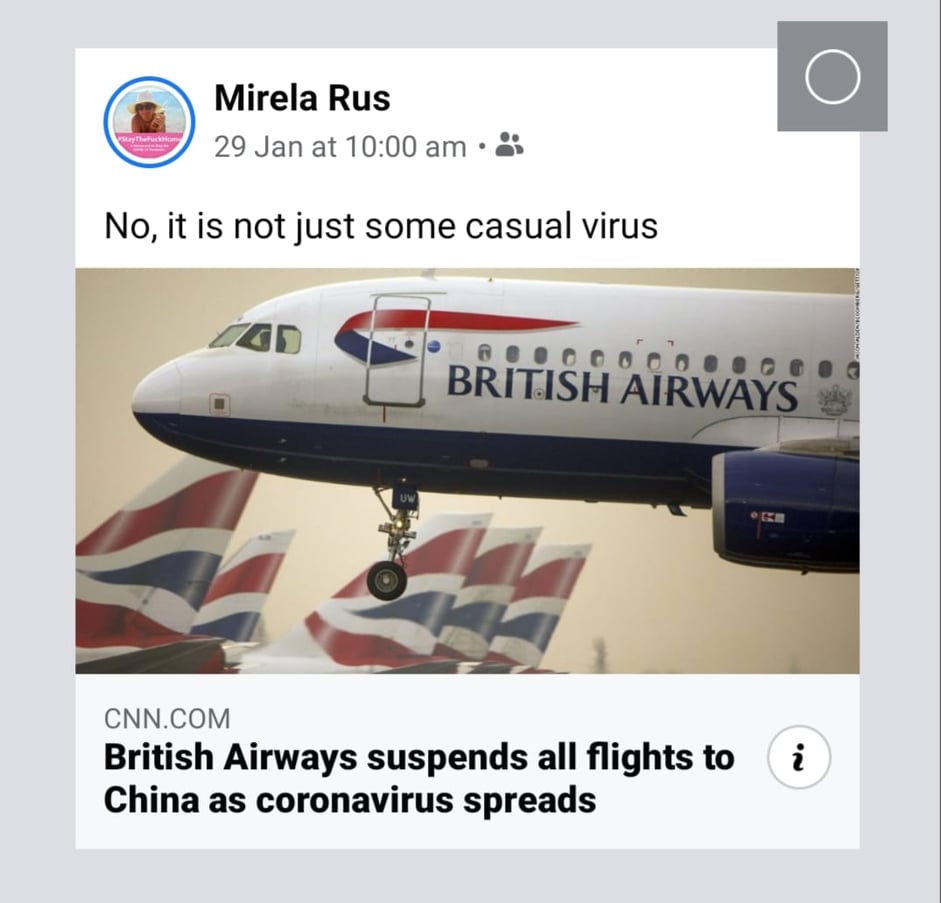
What is your impression of the way Croatia is dealing with the crisis? How safe do you feel?
Well, it all started pretty poorly. No Wuhan tourists bus should have been allowed in the country, but those were early days and I guess nobody wanted to believe this would turn out to be the pandemic scientists were warning us about for years. So – compared to what other countries were doing at the time – I cannot really blame Croatian authorities for not doing more.
But coming back to the present time, I feel safer here than I would feel anywhere else. I am VERY impressed on how authorities are now handling the crisis (and I would happily contribute to having a statue erected for Vili Beros and Alemka Markotic when this is over).
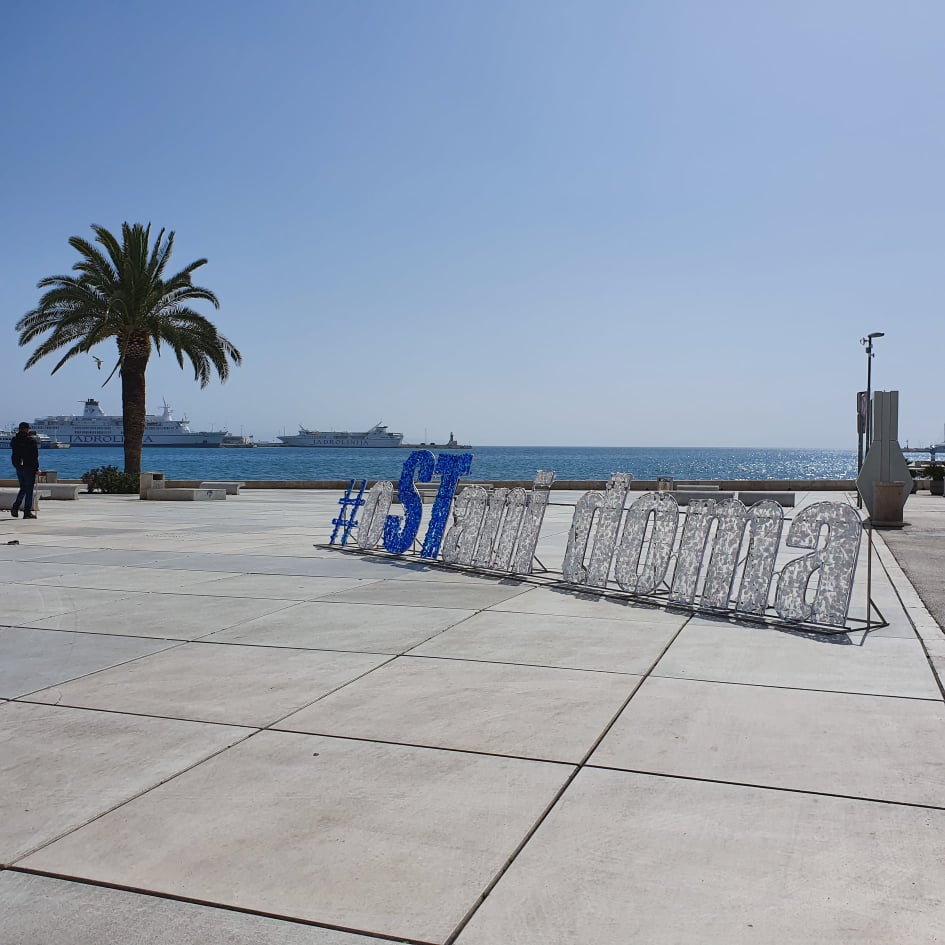
Now compare that to your home country and how they are handling it. What is Croatia doing better/worse?
There is really no comparison possible. I am so sad and mad with the way Romania is dealing with this crisis. The Bucharest government invoked pretty early on the emergency situation and that should have allowed it to take strong measures to restrict movement. But they didn’t, not really. The word to best describe the situation in Romania is chaos.
Medical staff are now resigning in droves in the last couple of days, after getting tired of shouting they do not have adequate equipment or even procedures on how to deal with patients, and rightfully fearing for their and their families’ safety. Medical staff accounts for 20% of the total confirmed cases right now.
As we speak there are 2245 confirmed coronavirus infected persons, and the situation gets worse by the minute. A whole town in Moldova region was just quarantined, after an outbreak at the local hospital. Corruption and incompetence are a daily occurrence in my home country, but now this combination is literally lethal. Combined with the fact that over 200 thousand Romanians have returned home from Italy, Spain or UK from the beginning of this month and many of them did not respect the isolation, I fear Romania is going to follow Italy’s scenario.
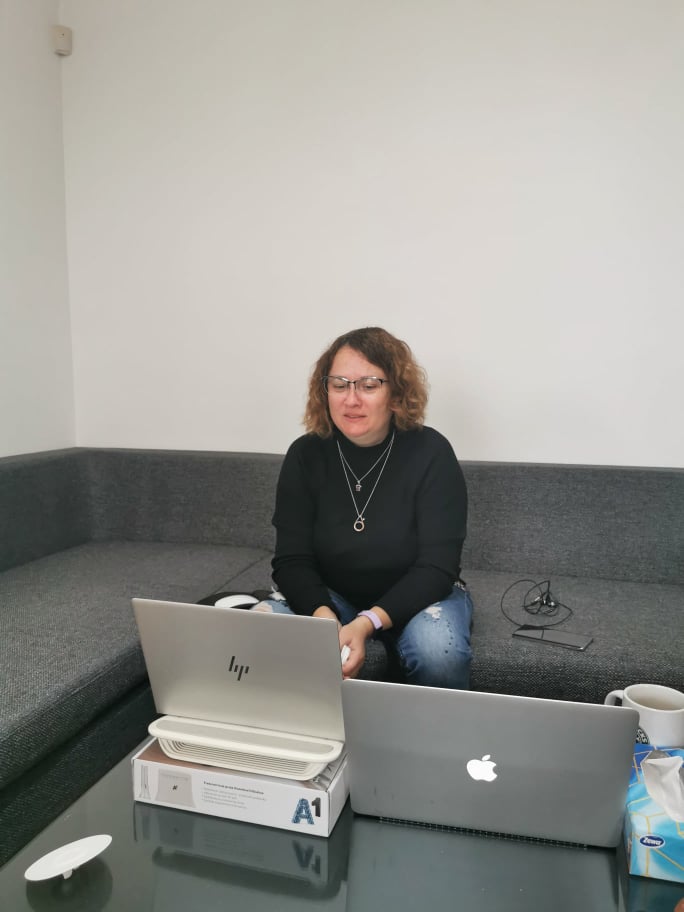
(The realisation of what lay ahead)
What about official communications from the authorities, compared to your home country?
It almost sounds crazy, but I feel so much better informed in a country whose language I still do not speak (TCN has a lot to do with that, as well as Slobodna Dalmacija which I refresh 20 times a day and read with Google Translate).
If someone writes a crisis communication manual after this is over, they will have to give Croatia as the prime example on how this has to be done. As a former journalist and political communications manager, myself, I am beyond impressed. We get all information in a clear manner, twice a day (once a day now), directly from the horse’s mouth, so to speak. The fact that they set up a 113 special coronavirus hotline and a website which now is also partly translated in English, the fact that minister Beros and also Mrs. Markotic do live Q&A sessions on Facebook and the fact the government is sending official info on Viber, that shows they totally understood the need for clear communication and used all tools available in this digital era.
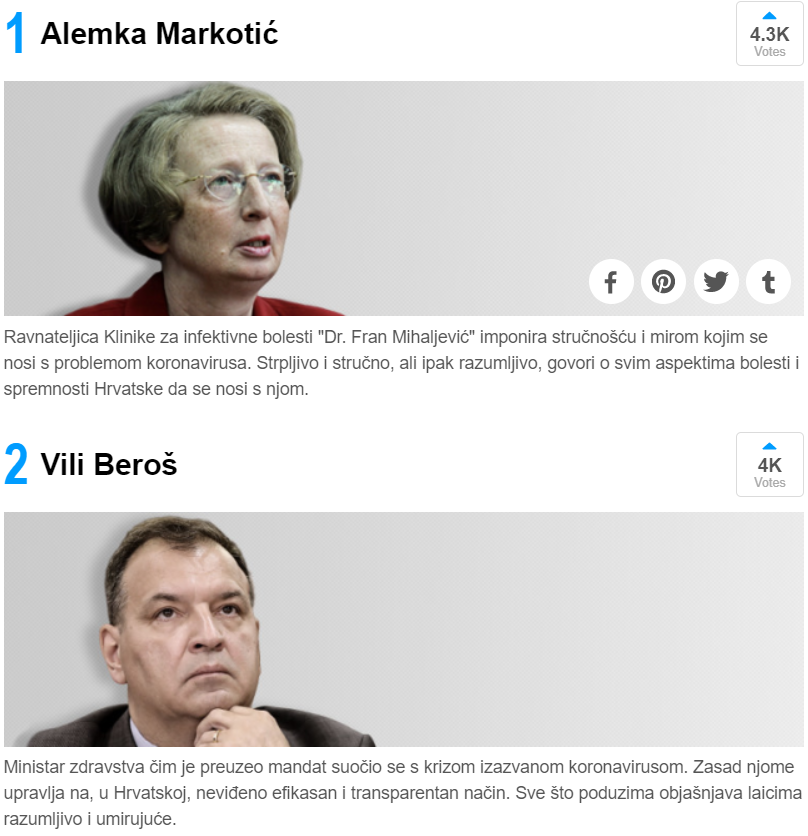
Unfortunately, Romania is at the other end of the spectrum on this, with indecisive action and poor and confusing communication. I will give you just one example, because it affects me personally. My mother is 81 and she lives alone (us three daughters are living all abroad, me in Croatia and my other two sisters in Italy and, respectively, in UK). A week or so ago, the government announced that people over 65 can leave their houses only from 11 am to 1 pm. But a few days later, they added that they can also go out in the evenings if they have dogs they need to walk. And, in case they need to go to the doctor or something else urgent, they can go out at any time during the day. Basically, they pretty much can go out just between 11-13, and also anytime. I would laugh, if it was not actually tragic, since we have a hard time convincing mum to just stay home.
And that is just a small, small example. A week or so ago, they issued an order forbidding local authorities to communicate the local number of cases. They basically decided to stop giving information about the number of cases in each county. The lack of transparency breeds paranoia and lack of trust in authorities, at a time when this is needed more than ever. I am watching from afar, hoping each day they will sober up and start doing the right things, the right way.
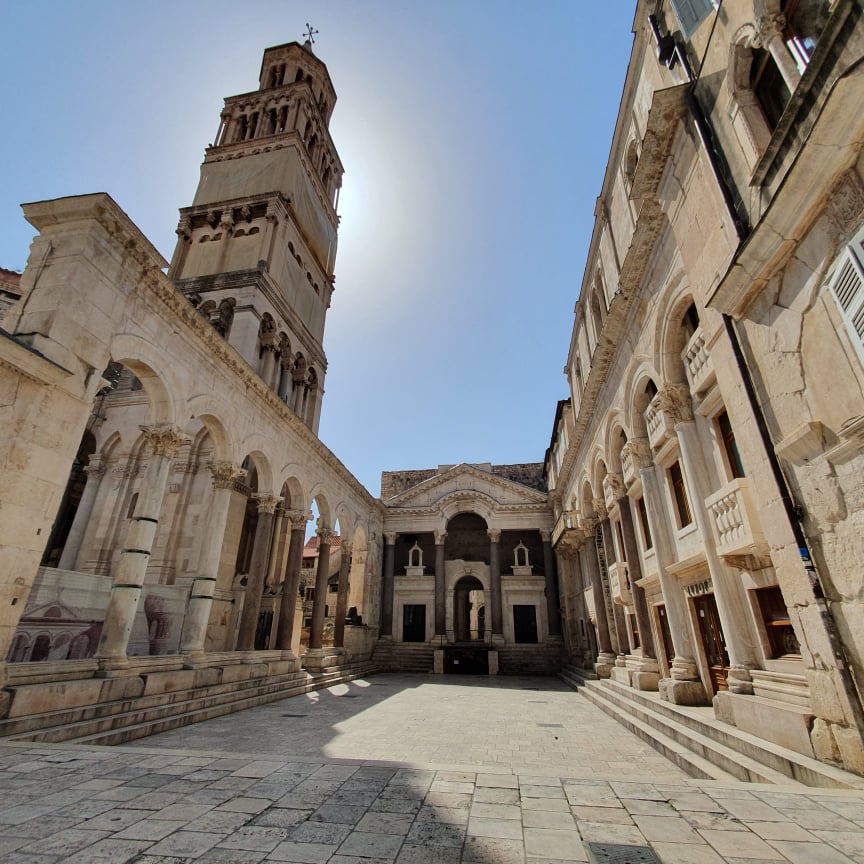
What's the one thing you wish you had taken with you into self-isolation.
My mum.
One thing you have learned about yourself, and one thing you have learned about others during this crisis.
I have learnt that cooking is my crisis/isolation coping mechanism. I usually like to cook when I have time, but since we are at home with basically no work to do, it is the main thing that refills my sanity level back up. We will come out of this with empty pockets, but a few kilos more (although I would have preferred it the other way around).
I cannot say I necessarily learnt new things about others, but I do feel more connected with friends and family, than ever before. The pause we are getting now, forced by the situation, makes us all, I guess, re-evaluate priorities and look at our lives in a new perspective. I cannot imagine our lives being again exactly the same as they were a month ago.
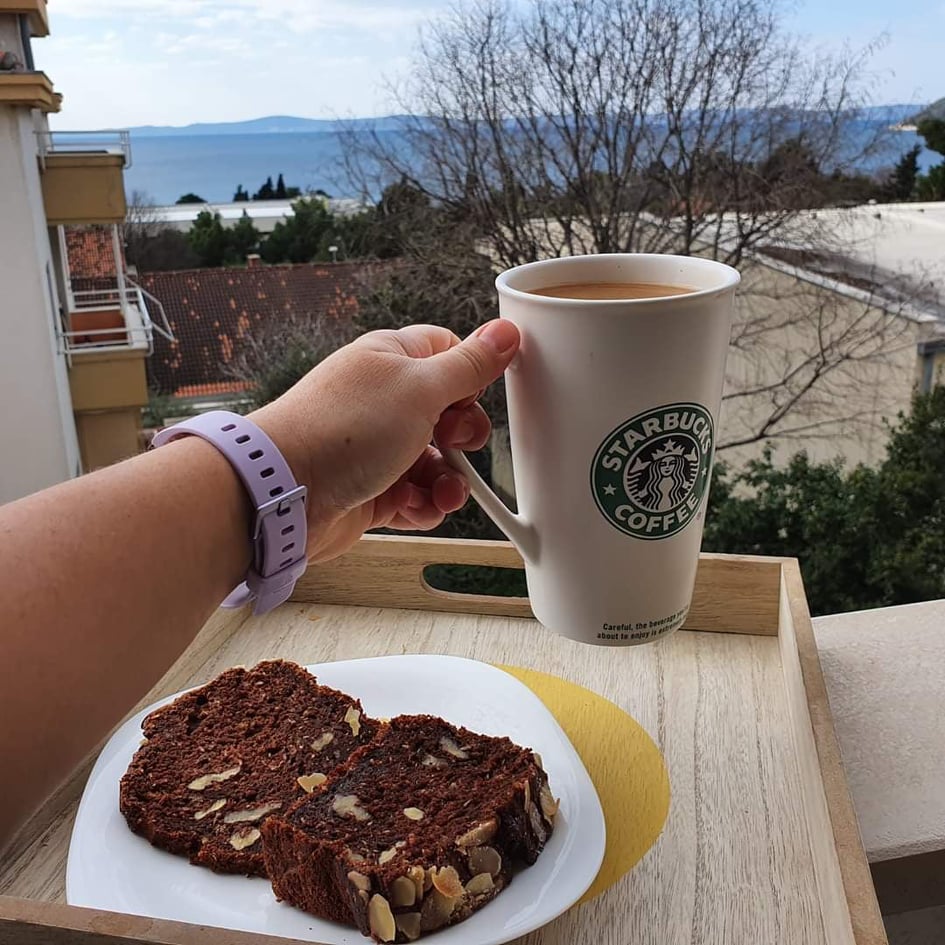
You can learn more about Mirela Rus and her wonderful Breatktime nautical jewellery business in our feature on her in the Foreign Entrepreneurs in Croatia section.
Thanks Mirela, stay safe and see you on the other side.
TCN is starting a new feature series on foreign experiences of sitting out covid-19 here in croatia compared to their home country. If you would like to contribute, the questions are below. Please also include a para about yourself and where you are from, and a link to your website if you would like. Please also send 3-4 photos minumum to This email address is being protected from spambots. You need JavaScript enabled to view it. Subject Corona Foreigner
If you would be interested to record a video version for our partners www.rplus.video please let us know in the email. Thanks and stay safe.
Foreigners Self-Isolating in Croatia: Do You Feel Safer Than in Your Home Country?
Firstly, how are you? Are you alone/with someone? Tell us a little about your situation and sanity levels.
What do you think about the economic measures the government is taking, are they helping your business? (PLEASE IGNORE IF THIS DOES NOT AFFECT YOU)
When did you realise that corona was going to be a big issue?
What is your impression of the way Croatia is dealing with the crisis? How safe do you feel?
Now compare that to your home country and how they are handling it. What is Croatia doing better/worse?
What about official communications from the authorities, compared to your home country?
What's the one thing you wish you had taken with you into self-isolation.
One thing you have learned about yourself, and one thing you have learned about others during this crisis.
TCN has recently become a partner in Robert Tomic Zuber's new R+ video channel, initially telling stories about corona experiences. You can see the first TCN contribution from this morning, my video from Jelsa talking about the realities of running a news portal in the corona era below. If you would like to also submit a video interview, please find Robert's guidelines below
VIDEO RECORDING GUIDE
The video footage should be recorded so that the cell phone is turned horizontally (landscape mode).
There are several rules for television and video news:- length is not a virtue- a picture speaks more than a thousand words
In short, this would mean that your story should not last more than 90 seconds and that everything you say in the report should be shown by video (for example, if you talk about empty streets, we should see those empty streets, etc.).
How to do it with your cell phone?First, use a selfie camera to record yourself telling your story for about a minute and a half. Ideally, it would be taken in the exterior, except in situations where you are reporting on things in the interior (quarantine, hospital, self-isolation, etc.). Also, when shooting, move freely, make sure everything is not static.
After you have recorded your report, you should capture footage that will tell your story with a picture, such as an earlier example with empty streets.
One of the basic rules of TV journalism is that the story is told in the same way as a journalist with his text. Therefore, we ask you for additional effort. Because we work in a very specific situation, sometimes you may not be able to capture footage for each sentence of the report. In this case, record the details on the streets: people walking, the main features of the city where you live, inscriptions on the windows related to the virus, etc.
The same rules apply if you are shooting a story from your apartment, self-isolation, quarantine. We also need you to capture footage that describes your story.
When shooting frames to cover your reports, it is important that you change the angle of the shot (in other words, shoot that empty street from several angles). Also, when shooting a detail, count at least five seconds before removing the camera to another detail.
The material should be about 5 minutes long (90 seconds of your report + frames to cover your story).
After recording everything, send us to Zagreb, preferably via WeTransfer to This email address is being protected from spambots. You need JavaScript enabled to view it.


